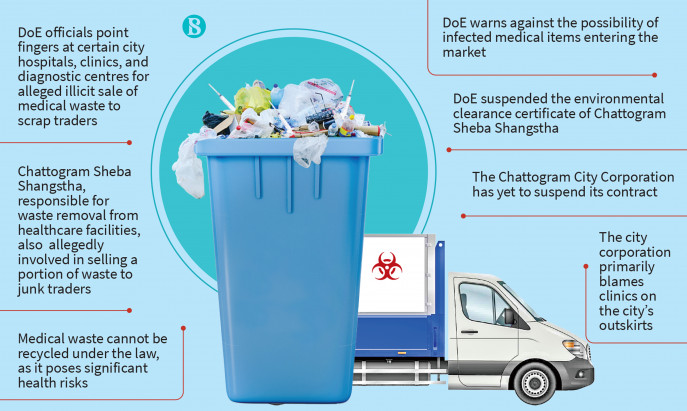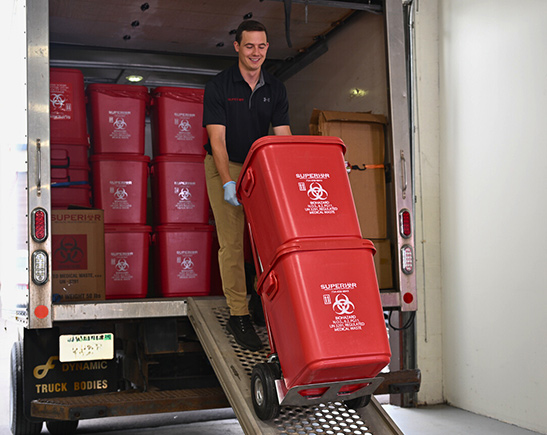Remain Ahead of Rules: Professional Advice on Medical Waste Disposal
In a world where the healthcare industry is regularly evolving, it is vital for clinical centers to remain in advance of guidelines when it involves the proper disposal of medical waste. With strict guidelines and regular regulative changes, it can be testing to navigate the complexities of this process. With expert suggestions, centers can ensure conformity and minimize threats linked with inappropriate waste disposal. From recognizing the various groups of clinical waste to carrying out the best collection and segregation techniques, this discussion will certainly give beneficial understandings and workable tips to assist centers stay in advance of laws in the ever-changing landscape of medical waste disposal.
Understanding Clinical Waste Categories
Comprehending medical waste categories is essential for correct disposal and monitoring in health care facilities. Clinical waste describes any type of waste created by medical care tasks that may posture a hazard to public health and wellness or the atmosphere. It is vital to categorize clinical waste properly to ensure its secure handling, treatment, transportation, and disposal.
There are several groups of medical waste that health care centers require to be familiar with. One of the most usual groups consist of infectious waste, pathological waste, sharps waste, pharmaceutical waste, and chemical waste. Each classification has certain standards and guidelines for its proper administration and disposal.
Contagious waste consists of products polluted with blood or various other bodily fluids, such as gloves, gowns, and lab cultures. Pathological waste refers to human tissues, body organs, or body components that need unique handling and disposal. Sharps waste includes utilized needles, syringes, and other sharp items that can cause injury and transmit infections. Drug waste comprises expired, unused, or contaminated drugs that need cautious handling and disposal. Chemical waste consists of solvents, anti-bacterials, and other chemical compounds utilized in medical care facilities.
Remaining Up-To-Date With Regulatory Modifications
Staying current with regulative modifications is important for health care facilities to ensure compliance and appropriate management of medical garbage disposal. medical waste removal service. With policies frequently advancing, it is necessary for health care facilities to remain up-to-date to avoid penalties, penalties, and potential injury to the atmosphere and public health and wellness
To remain ahead of governing modifications, healthcare centers ought to establish a system for surveillance and tracking updates. This can be done by subscribing to governing newsletters, going to workshops and meetings, and actively taking part in market organizations. Additionally, centers ought to mark a staff participant or team liable for remaining educated and distributing information to appropriate stakeholders.
Regular communication with governing companies is likewise crucial. Medical care centers should establish connections with neighborhood, state, and federal firms to ensure they are conscious of any changes in laws that may affect their waste monitoring methods. This can be done with normal conferences, involvement in public remark durations, and proactive engagement with regulative firms.
In addition, medical care centers must consider partnering with waste monitoring companies that concentrate on clinical waste disposal (medical waste disposal services with WasteX). These companies are typically skilled in the most up to date policies and can supply advice and assistance to guarantee compliance
Implementing Proper Collection and Segregation Techniques
To properly take care of clinical garbage disposal, healthcare facilities must establish proper collection and segregation methods in accordance with regulative guidelines. Executing these techniques guarantees the risk-free handling and disposal of potentially dangerous materials, safeguards the setting, and decreases the threat of injuries and infections to health care workers and the public.
Correct collection and partition methods include using designated containers and labeling systems. Medical care centers must give plainly identified containers for different sorts of clinical waste, such as sharps, contagious waste, pharmaceutical waste, and non-hazardous waste. These containers must be color-coded and plainly marked to avoid complication and advertise easy identification.
Additionally, medical care centers ought to educate their personnel on the appropriate procedures for collecting these details and setting apart medical waste. This consists of enlightening them on the different types of waste, the suitable containers to make use of, and the relevance of complying with guidelines and laws. Normal training sessions and refresher course courses must be carried out to ensure that personnel continue to be current on finest techniques.
In addition, healthcare centers need to establish a system for routine collection and disposal of clinical waste. This may involve partnering with licensed waste monitoring firms that focus on medical garbage disposal. These companies will certainly make sure that the gathered waste is delivered and gotten rid of in conformity with governing needs.
Selecting the Right Disposal Methods

Incineration is just one of one of the most common and efficient methods for disposing of specific types of medical waste, such as pathological waste and sharps. It entails the controlled combustion of waste at heats, decreasing it to ash. However, incineration can launch unsafe toxins into the air and add to air contamination.

Various other disposal techniques include chemical therapy, microwave therapy, and landfilling. Chemical therapy includes making use of chemicals to sanitize and neutralize the waste. Microwave therapy uses microwave energy to warmth and sanitize the waste. Landfilling entails burying the waste in a designated land fill area (medical waste disposal services with WasteX). Nevertheless, landfilling must be the last option because of the potential danger of contamination to dirt and groundwater.
Making Sure Compliance Through Paperwork and Training
After very carefully considering the proper disposal techniques for medical waste, medical care centers must ensure compliance with laws and lessen environmental influence by implementing effective documentation and training procedures. This step is important in maintaining a lasting and secure atmosphere for both healthcare workers and the general public.

Medical care employees that manage medical waste must get suitable training on waste segregation, dealing with, and disposal visit this site right here treatments. By providing extensive training, health care centers can equip their personnel to make educated choices and minimize the danger of incorrect waste disposal.
Conclusion
In verdict, staying in advance of guidelines in medical garbage disposal is important for health care facilities. medical waste removal. Understanding the different categories of clinical waste, remaining updated with governing modifications, carrying out appropriate collection and partition methods, choosing the suitable disposal methods, and guaranteeing conformity via documents and training are all important visit this website steps. By adhering to these guidelines, health care companies can successfully get rid of and manage of medical waste in a secure and accountable fashion
From comprehending the various classifications of medical waste to applying the ideal collection and segregation methods, this conversation will give useful insights and actionable tips to aid facilities remain in advance of guidelines in the ever-changing landscape of clinical waste disposal. - medical waste disposal services with WasteX
The most usual categories include infectious waste, pathological waste, sharps waste, pharmaceutical waste, and chemical waste. Health care facilities must supply plainly identified containers for different types of medical waste, such as sharps, contagious waste, pharmaceutical waste, and non-hazardous waste. Medical care centers should develop a thorough system to tape-record and track all facets of clinical waste disposal, consisting of kinds of waste created, amounts, and disposal approaches utilized. Health care employees that manage clinical waste ought to get suitable training on waste segregation, dealing with, and disposal procedures.